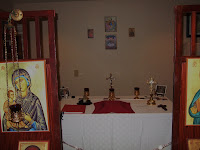
- God is Mystery (check)
- God is "everywhere present and fills all things" (check)
- God loves and is a befriending God (check)
- God came in the flesh to save us from death (check)
- Jesus, who is God Incarnate, died and then came back to life (check)
- We are never, at any time, without hope (check)
But a funny thing happened on the way to the altar. The first few years, I was more a skeptic-with-hope; now I seem not to need the skepticism anymore. And this is a strange realization -- that skepticism was as much a need for me as faith was. Skepticism was my safety-net, just in case I ended up being a fool. If, at the end of all things, my beliefs about Jesus turned out to be a fantasy, I wanted to be able to say, "Yeah, but I wasn't absolutely sure. I wasn't operating on blind faith. I STILL HAVE A BRAIN, ya know."
Of course, I wasn't sure who it was I'd be saying this to, because if the atheists are right, I won't exist anymore, anyway.
Am I simply more psychologically invested in my faith? Yes, definitely. But it's more than that. It's a kind of caution-to-the-wind thing -- a lack of concern over whether others find me foolish. And what happens now is that I encounter God more frequently, now that I don't hold back. There's a freedom in this -- in being able to light the candles in the chapel and not second-guess myself in the middle of the night, but to simply know that Christ is present with me. It is, I think, something like the stages of falling in love. At first, we are unsure of the beloved -- we don't know whether we can trust him, even though we are attracted and he seems attracted back. But after some time goes by, the relationship develops a surety. I've noticed this in 26 years of marriage. And I notice it in my faith.
So I find I am at a new phase now. One that fills me with wonder.
